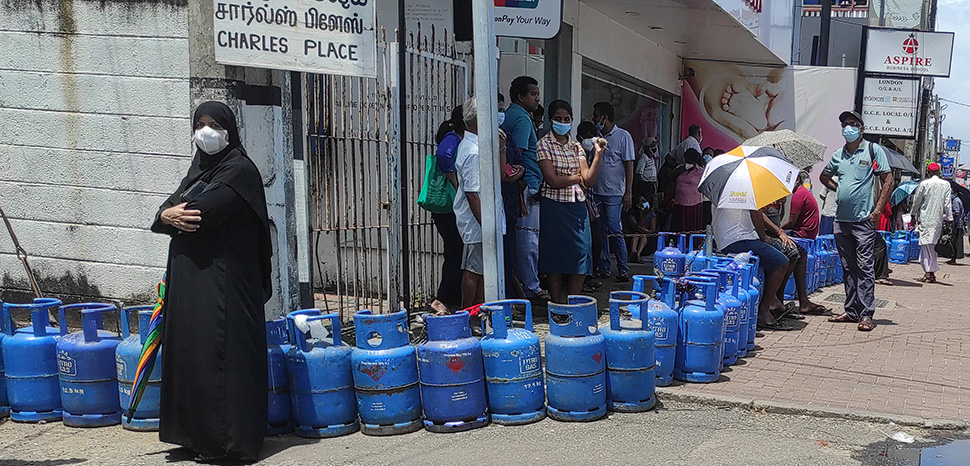Varun Mohan

The Sri Lankan economic crisis recently reached a tipping point when protesters marched into the Presidential Palace on July 9, marking the end of 10 years of Rajapaksa family rule in the country. The status of Rajapaksa remains unknown; he is believed to have initially flown to the Maldives, then to Singapore, and at present he might be in Saudi Arabia. His brother was stopped at the airport after a notice was issued by the Sri Lankan court to block Rajapaksa family members from leaving the country.
The ongoing political saga, which directly stems from the worsening economic crisis in Sri Lanka, is similar to events that happened in 18th century France leading up to the French Revolution.
The primary reason for the French Revolution is considered to be social inequalities, an absolute monarchy coupled with lack of good governance, and poor economic conditions including a series of fiscal crises, structural deficiencies, and crippling debt. This paints a similar picture of Sri Lanka today. President Rajapaksa’s dictatorial rule and complete disregard for democratic values and governance have completely ruined Sri Lanka, which is still recovering from four decades of civil war. The Rajapaksa family member’s influence in day-to-day government activity and deep-rooted corruption has structurally weakened the national economy and political institutions. The Sri Lankan people made history repeat itself via their march to the Presidential Residence, an act that closely resembles the storming of the Bastille during the French Revolution.
Since the start of the COVID-19 pandemic, early warnings have been coming in about the degenerating economy in Sri Lanka. Unsustainable borrowing by the government and short-sighted domestic policies have led to the present foreign exchange crisis. Currently, the country is surviving on credit and is expecting a bailout package from the IMF. In numerous images from Colombo, the Sri Lankan police – considered to be the symbol of the modern nation-state itself – are seen helpless Infront of the crowd, and their clearing the path for the people to reach the Presidential Residence is symbolic of the collapse of the state apparatus. This brings one of the fundamental ideas of political science into question: the social contract, whereby a group of people decide to exchange a certain set of rights for sovereignty and accept a central and common authority to protect another set of rights. The liberal democratic ideal is built on the concept of this social contract.
The Social Contract and Sri Lanka
Political philosopher Jean-Jacques Rousseau, one of the founding fathers of modern social contract theory, advanced the idea of a social contract. One can argue that he has a major influence on the French Revolution and induced the people to set a democratic government based on the idea of the social contract. The 21st century French Revolution moment in Sri Lankan politics emphasizes the importance of Rousseau’s idea of ‘general will’ – a collective will that aims for the common interest or common good of the people. For Rousseau, the purpose of the sovereign is to carry forward the ‘general will.’ In the practical sense, the consent of the people is what allows any government to work.
The purpose of the social contract is to avoid the ‘state of nature’ situation and to provide stability and security for the development and freedom of everyone. The Rajapaksa government failed to provide this. Firstly, the impact of the COVID-19 pandemic on the tourism industry, and then the tax cuts along with a domestic ban on imports of chemical fertilizer, all combined to put major pressure on the economy. When the Ukraine war broke out these pressures became too much to withstand, causing the island to default on its first loan in its entire history as an independent state. High inflation and lack of access to essentials have pushed people into acute poverty. Thus, the government’s irresponsibility and unsustainable policies did not just hurt people physically and financially, it also led to an emotional drive to protest against the corrupt system; people felt they needed to save their land.
Consent of the People
Under such conditions, social contract theory provides an opportunity to register protests against the government. In Sri Lanka, such protests led to the flight of both the president and the prime minister. The image of protesters watching the news inside the Presidential Residence about their own breach of the premises is not something to laugh at; instead, it marks an important event in the history of the world, one that upholds the role of the people and their consent in how the state is run.
The cornerstone of any contract is consent. Whenever this consent is broken, revolution erupts. All revolutions are not violent and bloody. The same people who are protesting in the streets of Colombo elected President Gotabaya Rajapaksa in the 2020 election with a landslide margin. The contract is a two-way transaction; if one side does not keep its promise, the consent is broken. In such cases, the state needs to be reshaped – not just the government, but the entire socio-political structure of the country.
The March Forward
Sri Lanka cannot continue with the present corrupt and elitist political system. Any political party/family or individual in Sri Lanka will remember the scenes of July 9, 2022. The impact will not just remain on the island; the message is clear to all political elites in the world – general will is cardinal.
The French Revolution marked the end of the institution of absolute monarchy and authoritarianism in France. It made equality, liberty, and fraternity fundamental principles of any subsequent government. In Sri Lanka and many other states across the globe, there is a need to revisit the idea of democracy. The legitimacy of any government is built on the people and their rights, not on loans.
No comments:
Post a Comment